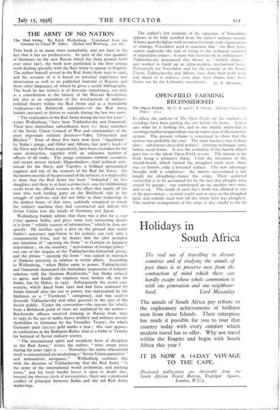THE ARMY OF NO NATION
The Red Army. By Erich Wollenberg. Translated from the German by Claud W. Sykes. (Seeker and Warburg. los. 6d.) THIS book is in many ways remarkable, and not least in the fact that it has no predecessors. In spite of the vast quantity of literature on the new Russia which has been poured forth ever since 1917, the book now published is the first serious work dealing specially with the Red Army to appear in English. The author himself served in the Red Army from 1921 to 1936, and his account of it is based on personal experience and observation as well as on published material in Russian and three other languages, of which he gives a useful bibliography. The book he has writtell is of first-rate importance, not only as a contribution to the history of the Russian Revolution, but also as an exposition of the development of military- political theory within the Red Army and as a formidable vindication—by Bolshevik standards—of the Red Army leaders executed or driven to suicide during the last two years.
" The real leaders of the Red Army during the last few years ", writes Wollenberg, "have been Tukhachevsky and Gamarnik.
Their best immediate subordinates were three members of the Soviet Union Council of War and commanders of the most important military districts—Yakir, Uborevitch and Bliicher." Four of these five have now been " liquidated " by Stalin's purge, and Orlov and Alksnis, last year's heads of the Navy and Air Force respectively, have been overtaken by the same destruction, together with an unknown number of officers of all ranks. The purge continues without cessation, and recent arrests include Shaposhnikov, chief political corn- missar for the Navy, and Tupolev, a brilliant aeronautical engineer and one of the creators of the Red Air Force. On the known records of the personnel of the services, it is impossible to deny that the Red Army has been " beheaded " by this slaughter, and there is at least a prima facie case for withholding credit from the official version to the effect that nearly all the men who took leading parts on the Bolshevik side in the struggle of 1918-20, and did not falter in their leadership in the darkest hours of that time, suddenly conspired to wreck the military machine they had constructed and deliver the Soviet Union into the hands of Germany and Japan.
Wollenberg frankly admits that there was a plot for a coup d'etat against Stalin, and gives some very interesting detail of it from " reliable sources of information," which he does not specify. He justifies such a plot on the ground that under Stalin's autocracy opp(k.ition to his policies can only take a conspiratorial form, and he denies that the plot included any intention of " opening the front " to German or Japanese imperialism ; on the contrary, " activization of foreign policy " was one of the slogans of the Tukhachevsky-Gamarnik group, and the phrase " opening the front " was coined in reproach of Stalinist passivity in relation to world affairs. According to Wollenberg, " when Hitler came to power, Tukhachevsky and Gamarnik demanded the immediate suspension of military relations with the German Reichswehr," but Stalin refused to agree, and finally the relations were broken off, not by Stalin, but by Hitler, in 1935. Subsequently the secret con- vention, which dated from 1922 and had been endorsed by Stalin himself after his rise to power, was represented by the Stalinists as a " Trotskyist " conspiracy, and was used to discredit Tukhachevsky and other generals in the eyes of the Soviet public. Under the convention—the reasons for which, from a Bolshevik point of view, are explained by the author- Reichswehr officers received training in Russia from t922 to 1935 in the use of tanks, heavy artillery and military aircraft (forbidden to Germany by the Versailles Treaty), for which Germany paid 250,00o gold marks a year ; this sum appears in confessions at the Bukharin-Rykov trial as a bribe to Trotsky for betrayal of Soviet military secrets.
" The international spirit and socialistic basis of discipline in the Red Army," writes the author, " were swept away during the years 1931-3. . . . Nowadays the entire educational work is concentrated on inculcating a ' Soviet Union patriotism '
and nationalistic arrogance." Wollenberg contrasts this with the doctrine of Tukhachevsky that the Red Army " is the army of the international world proletariat, and nothing more," and his book hardly leaves it open to doubt that, beyond the obvious clash of personalities, there was a profound conflict of principle between Stalin and the old Red Army leadership.
The author's low estimate of the capacities of Voroshilov appears to be fully justified from the latter's military record. A brave guerilla fighter with no talent for large-scale organisation or strategy, Voroshilov used to maintain that " the Red Army cannot undertake the task of rising to the technical standard of imperialist armies ; it must win victories by its enthusiasm." Tukhachevsky denounced this theory as " foolish chatter," and worked to build up an ultra-modern, mechanised force. Fortunately for Voroshilov and for the security of the Soviet Union, Tukhachevsky and Alksnis have done their work well, and much of it endures even after their brains have been blown out by the Lubianka executioner. G. F. HUDSON.










































 Previous page
Previous page